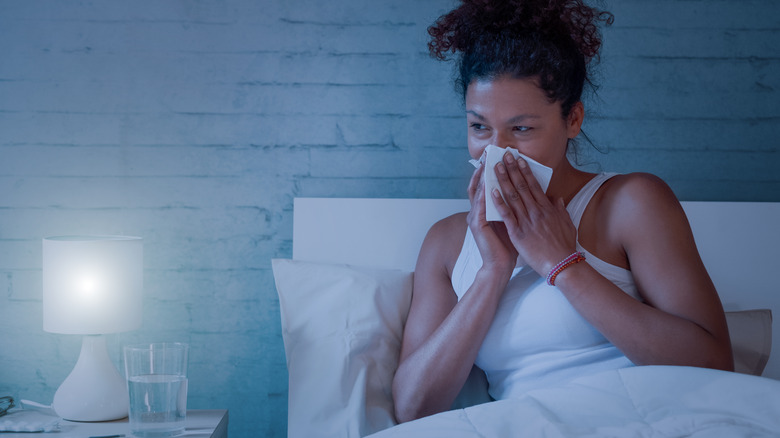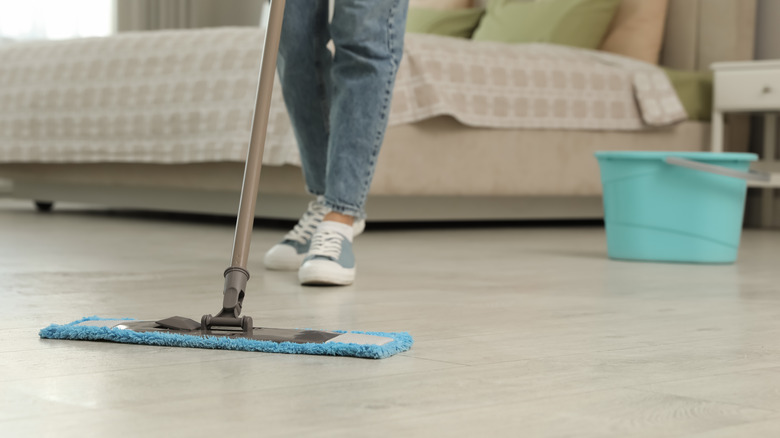Why Your Allergies Get Worse At Night
Even if you practice good sleep hygiene every night, allergies can often wreck your ability to sleep. According to Carolina Asthma, 90% of people with allergies have trouble sleeping. Your favorite antihistamine might help you forget your allergies during the daytime, but nighttime seems to bring on more sneezing, congestion, itchy throat, and watery eyes.
Your allergies could seem worse at night for a few reasons. When you think about it, lying down moves all that gunk from your nasal passages into your throat. That could have you tossing and turning as you try to breathe freely. People who are allergic to dust mites might have more intense symptoms at night, since the bedroom is the favorite place for dust mites to live. If mold causes an allergic reaction, you could have household mold hiding in places around your bed — particularly if your bed is near a bathroom with little ventilation. Pollen from the outdoors typically triggers seasonal allergies, but you could be bringing them into your home through your clothing, hair, and skin. That same pollen could wind up in your bedding, giving you no relief from your allergies as you try to sleep.
Other causes of nighttime allergies
You love your pet, and your pet loves you, but sleeping with your beloved creature could also trigger your allergies. You could also be allergic to the dander on your pet — so if your dog or cat naps on your pillow during the day, it could cause watery eyes and wheezing at night. Your pets also bring all kinds of pollen into your home through their paws and fur.
If you live in the city, the American College of Allergy, Asthma, and Immunology says that up to 98% of homes could have cockroaches. The saliva, feces, and body parts they tend to leave around your house could trigger your allergies.
Your breathing patterns at night can also exacerbate symptoms. If your allergies make it difficult to breathe through your nose, at night you may end up breathing more through your mouth. Because your nose works to filter the air you breathe, breathing more through your mouth means more allergens entering your throat and lungs. And just as your sleep follows a circadian rhythm, so do your allergies. The hormones that regulate your allergies tend to be lowest when you're in your deep sleep stage.
How to reduce nighttime allergies
You can minimize some of your allergies at night by making a few changes. MedicineNet suggests a good cleaning of your bedroom by wiping down all surfaces, paying attention to any areas that might have mold. Removing carpeting can rid your home of allergens and mold. But if you do choose to keep your carpeting, be sure to clean it often. Consider allergy-free bedding and pillows and cover your bedding and mattresses with dust mite covers. Using a HEPA air filter can help clean some of the air in your bedroom. You should also wash your bedsheets and pillowcases each week in 130-degree temperature water to kill dust mites (via Carolina Asthma). If you know your dwelling is prone to cockroaches, have an exterminator identify any areas where they might be coming into your home.
When pollen levels are high, take a shower before bedtime and keep your outdoor clothes away from your bedroom. Although it's often peaceful to sleep with a nice breeze coming through your window, this also brings pollen into your home. Shutting the windows at night will prevent these allergens in your home, particularly in the early morning when their levels are highest. Finally, keeping your beloved pet away from your bed might be difficult, but it might help ease those allergies at night.



